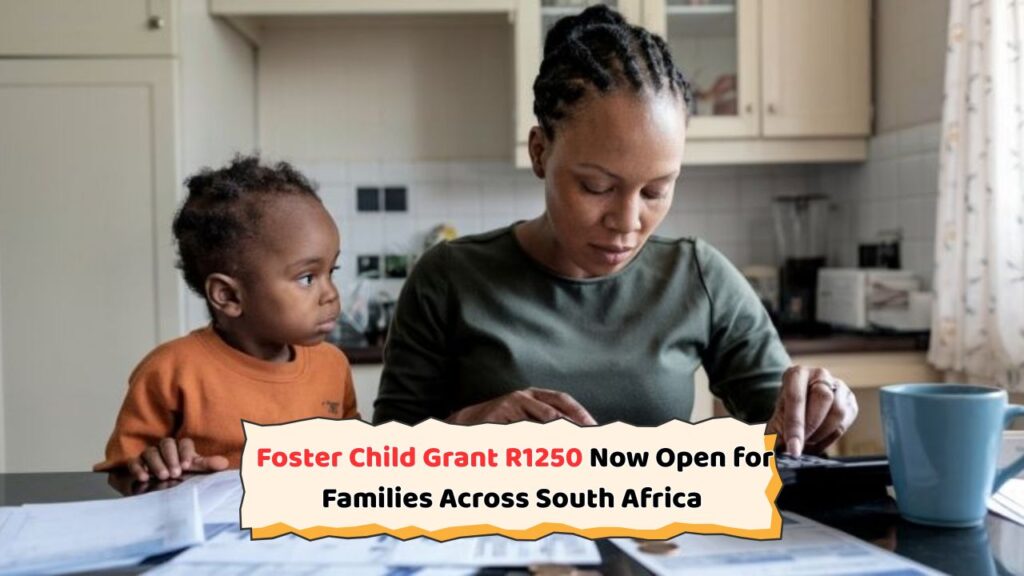Foster Child Grant 2025: In an effort to support families and guardians in providing a stable and nurturing environment for children, the South African government has announced the Foster Child Grant for 2025, offering R1,250 per month to eligible parents. This initiative underscores the importance of fostering and aims to ease the financial burden on families who open their hearts and homes to children in need. With the rising cost of living, this grant is a welcome relief for many South Africans who have taken on the responsibility of fostering. The grant not only aids in the financial aspects of caregiving but also highlights the government’s commitment to the well-being of foster children across the nation.

Understanding the Foster Child Grant 2025 Application Process
Applying for the Foster Child Grant 2025 is a straightforward process designed to ensure that eligible families can access the support they need without unnecessary hurdles. Prospective applicants must first ensure that they meet all the necessary criteria, which include having legal custody of the foster child and being a South African citizen, permanent resident, or refugee. The foster child must also reside with the applicant in South Africa. To apply, individuals need to visit their nearest South African Social Security Agency (SASSA) office where they will be required to complete the application forms. It is crucial to bring along necessary documentation such as the child’s birth certificate, a certified copy of the court order placing the child in foster care, and identification documents of the foster parent. SASSA officials are available to assist with any queries and provide guidance throughout the application process. With proper preparation, eligible foster parents can secure this financial aid to better support their foster children.
Eligibility Criteria for Receiving the Foster Child Grant in 2025
The eligibility criteria for the Foster Child Grant 2025 are set to ensure that the funds reach those who genuinely need them. To qualify for the grant, the applicant must be legally recognized as the foster parent of the child. This status is typically granted by a court order which confirms the child’s placement under the applicant’s care. Additionally, the foster child must be under the age of 18, although the grant can be extended until the age of 21 if the child is still in school. The applicant must also meet residency requirements, being either a South African citizen, permanent resident, or recognized refugee. Importantly, the grant is intended for those whose financial situation necessitates assistance, and as such, applicants should be prepared to provide evidence of income and financial status if requested. The grant is a lifeline for many, ensuring that foster children can grow up in supportive and stable environments.
How the Foster Child Grant Empowers South African Families
The Foster Child Grant 2025 plays a pivotal role in empowering South African families who devote their time and resources to raising foster children. By providing a monthly stipend of R1,250, the grant helps to alleviate some of the financial pressures associated with childcare. This funding can be used for basic necessities such as food, clothing, healthcare, and education, ensuring that foster children receive the same opportunities as their peers. The grant also allows foster parents to focus more on the emotional and developmental needs of the child, knowing that financial constraints are somewhat mitigated. Moreover, it affirms the government’s commitment to child welfare and underscores the societal value placed on fostering. By supporting these families, the grant helps foster children to thrive and develop into well-adjusted members of society.
The Long-Term Impact of the Foster Child Grant on Child Welfare
The long-term impact of the Foster Child Grant on child welfare in South Africa is profound. By providing consistent financial support to foster families, the grant helps ensure that foster children have access to a stable and nurturing environment, which is crucial for their development. Over time, these children can benefit from improved educational outcomes, better health, and a higher quality of life, all of which contribute to breaking the cycle of poverty and disadvantage. Additionally, the grant encourages more families to consider fostering, thereby reducing the number of children in institutionalized care and promoting family-based care solutions. This shift not only benefits the children but also strengthens communities as more individuals take active roles in supporting vulnerable children. Ultimately, the Foster Child Grant is an investment in the future of South Africa, fostering a generation of young individuals who are well-equipped to contribute positively to society.




